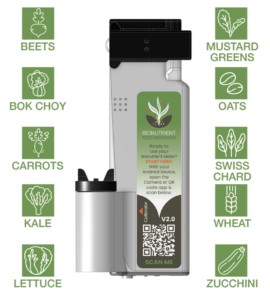VU Amsterdam Athena Institute: the Bionutrient Meter Challenge
The VU Amsterdam’s Athena Institute addresses complex societal issues. It aims to bring together all stakeholders involved in these challenges, particularly those voices who often remain unheard. By learning from each other, the institute investigates how to instigate system transformation.
Community Service Learning (CSL) is a form of education, in which students use their academic skills to contribute to societal issues. CSL stimulates (among others) critical thinking, problem-solving competencies, personal development, interpersonal skills and cultural understanding.
By way of CSL, Local2Local and the Athena Institute VU Amsterdam are now recruiting 5-7 motivated students from different master programmes who want to contribute to our challenge through their master thesis or internship.
The challenge
How can the Bionutrient Meter be a driver of food system transformation?
Themes to be researched in this project include:
Student (1) – from business administration or (social) entrepreneurship, e.g. what are suitable business models for the Bionutrient Meter;
Student (2) – from social entrepreneurship position e.g. to what extent the Bionutrient Meter can foster new opportunities for social value creation (e.g. new products and/or services for healthier eating habits and/or production/consumption/distribution of food in a more environmentally friendly way);
Student (3) – from behaviour sciences position e.g. to what extent can the Bionutrient Meter drive consumer behaviour change?
Student (4) – from natural science position e.g. how to scientifically establish the relationship between soil health and the nutritional value of crops? (e.g. through a systematic review and meta-analysis);
Student (5) – from social science position e.g. to what extent changes at the local level can trigger systemic change?
Student (6) – from policy, business, management or economics e.g. how such biometer may contribute to changes in the existing financial system, such as financial rewards for those that contribute to biodiversity, nature, health and landscape;
Student (7) – business administration, entrepreneurship: new business models for farmers; to what extent can the Bionutrient Meter promote the adoption of responsible soil management and regenerative principles (e.g. circularity) by farmers;
Student (8) – open theme: students from any other background who have questions related to the challenge but which is not directly linked to the above sub-themes.

What is a Bionutrient Meter?
In short, it is a handheld ‘spectrometer’ to measure the nutrient density in food and crops, as well as carbon in the soil. It was made possible through the Bionutrient Institute lab in Michigan. Spectroscopy is a well-developed technology that can discern the makeup of materials using a noninvasive flash of light.
Healthy food comes from healthy plants, and healthy plants come from biologically vital, ecologically regenerative, and carbon-rich soils.
But what is the definition of healthy food? Consumers have had few cues at their disposal for determining the relative nutritional value of specific fruits and vegetables. The truth is we haven’t known the quality of our food, because nutrient density has not previously been measurable.
But imagine going to the farmers market, flashing a light at several different carrots, and comparing their nutritional value in real-time. Readings might show that some carrots are nutrient-dense, while others are not. Which ones would you buy? Would you start to choose food based on how good it was for you and your family? Read on here.
Background information
Also watch the insightful webinar ‘Ask Dan’ with Dan Kittredge from March 15th 2023 and our video playlist of the Vital Food Community event on November 4th 2022.
We are very much looking forward to start this epic challenge!